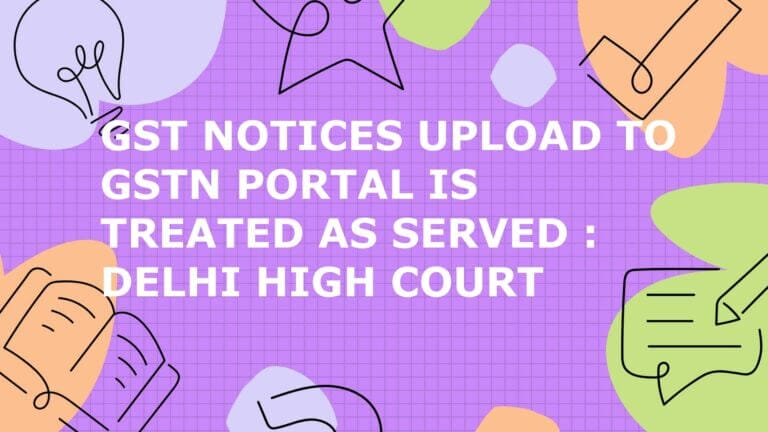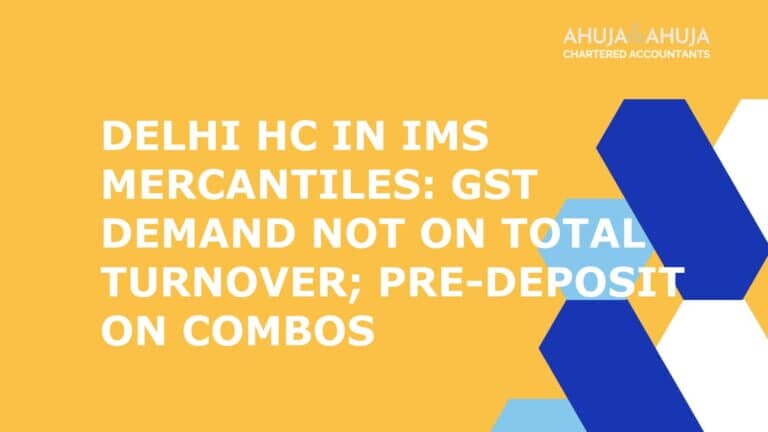GST Appeals – 4 Months Limitation Not Set in Stone, Decide on Merits: High Court
GST Appeals and the Four-Month Limitation: A Turning Point in Tax Litigation
The Goods and Services Tax (GST) regime, while aiming for uniformity and efficiency, has often left taxpayers and professionals grappling with procedural hurdles—none more daunting than the strict limitation period for filing appeals. Under the GST law, an aggrieved party typically has three months to file an appeal, with a possible extension of one additional month if sufficient cause is shown. This four-month window has, until now, been treated as a hard stop by many appellate authorities, leading to outright dismissal of appeals filed even a day late, regardless of the underlying merits.
The recent ruling by the Punjab & Haryana High Court in GK Housing & Developers Pvt Ltd vs State of Punjab marks a significant shift in this landscape. By setting aside the mechanical rejection of an appeal delayed by four months, the Court has clarified that justice cannot be sacrificed at the altar of technicality. This article unpacks the judgment, the judicial precedents it draws upon, and its practical implications for taxpayers, professionals, and the GST appellate process.
Understanding the Legal Framework and the Case at Hand
Statutory Limitation for GST Appeals
Section 107 of the Central Goods and Services Tax Act, 2017, governs appeals to the Appellate Authority. It prescribes a limitation period of three months from the date of communication of the order, with a further one-month extension at the discretion of the authority, provided sufficient cause for delay is shown. Traditionally, authorities have interpreted this as an absolute bar—if an appeal is filed beyond four months, it is dismissed as time-barred, often without examining the reasons for delay or the merits of the case.
Case Facts: GK Housing & Developers Pvt Ltd vs State of Punjab
GK Housing & Developers Pvt Ltd found itself on the wrong side of this procedural rigidity. The company filed an appeal against a GST order, accompanied by an application seeking condonation of a four-month delay. The Appellate Authority, however, rejected the appeal outright, citing the absence of any statutory provision to condone delays beyond four months. A subsequent review application met the same fate, dismissed on the ground of maintainability.
Customary Approach to Delay in GST Appeals
This approach—treating the four-month limitation as inviolable—has been the norm across many GST appellate forums. The result: appeals, sometimes involving substantial questions of law or fact, are nipped in the bud without any consideration of their merits, simply because of a procedural lapse.
The High Court’s Clarification: Substance Over Form
Interpreting the Limitation Provision
The Punjab & Haryana High Court, in a decisive departure from the mechanical application of limitation, held that the Appellate Authority must not dismiss appeals solely on the ground of delay. Instead, it is “incumbent upon the Appellate Authority to have, at the least, considered the reasons projected that caused the delay and examined the sufficiency thereof.” The Court further emphasized that the merits of the appeal must be examined, especially since the right to appeal is a substantive one.
From Mechanical Dismissal to Merit-Based Scrutiny
This ruling signals a shift from a “tick-the-box” approach to a more nuanced, justice-oriented process. The Court made it clear that procedural rules are meant to advance, not obstruct, the cause of justice. Dismissing appeals without considering the reasons for delay or the merits of the case undermines the very purpose of appellate remedies.
Emphasis on Substantive Rights and Pragmatism
The judgment underscores that the right to appeal is not a mere formality but a substantive right. The Court observed that a pragmatic, rather than pedantic, approach must be adopted—one that prioritizes the cause of justice over technicalities. The petitioner, after all, stood to gain nothing by delaying the appeal, and the authority’s refusal to even consider the reasons for delay was found wanting in application of mind.
Judicial Precedents: Building a Liberal, Justice-Oriented Approach
The High Court’s reasoning is not in isolation. It draws strength from a series of Supreme Court and High Court decisions that have consistently favoured a liberal approach to condonation of delay, provided there is no gross negligence or mala fide intent.
Living Media India Ltd (2012) 3 SCC 563
The Supreme Court in this case observed that, “a liberal concession has to be adopted to advance substantial justice,” especially where there is no evidence of gross negligence or deliberate inaction. The focus, the Court said, should be on substantial justice rather than technicalities.
Mahadeo Vithoba Nikam vs Gajanan Pandurang Kulkarni (1998) 9 SCC 716
Here, the Supreme Court set aside orders that dismissed an appeal solely on the ground of delay, remanding the matter for a fresh decision on merits. The message was clear: even significant delay should not preclude a hearing on merits if the reasons are bona fide.
Arvind Gupta vs Assistant Commissioner of Revenue State Taxes
In this recent Punjab & Haryana High Court case, the Appellate Authority’s refusal to condone delay beyond four months was quashed, and the authority was directed to decide the appeal on merits.
Collective Impact
These precedents, read together, establish that the judiciary favours a justice-oriented approach—one that weighs the sufficiency of reasons for delay and the merits of the case, rather than shutting the door on technical grounds.
Key Takeaways So Far
- The four-month limitation for GST appeals is not an unbreakable barrier; authorities must consider reasons for delay and the merits of the case.
- The High Court’s ruling is rooted in established judicial principles that favour substantive justice over technicality.
- Taxpayers and professionals now have a stronger footing to seek condonation of delay, provided they act bona fide and can substantiate their reasons.
Practical Guidance: Navigating Delayed GST Appeals Post-Ruling
The Punjab & Haryana High Court’s decision is a welcome relief, but it does not mean that every delayed appeal will be condoned as a matter of course. Taxpayers and professionals must approach delayed GST appeals with care, preparation, and a clear focus on both the reasons for delay and the merits of the case.
Steps for Taxpayers and Professionals Facing Delayed GST Appeals
- Assess the Grounds for Delay:
Before filing, honestly evaluate why the delay occurred. Was it due to illness, miscommunication, technical glitches, or other unavoidable circumstances? The more genuine and specific the reason, the better. - Document Everything:
Collect and preserve all supporting documents—medical certificates, correspondence, system error screenshots, or any evidence that substantiates the delay. Courts and authorities look for credible, contemporaneous proof. - Draft a Focused Condonation Application:
Clearly explain the cause of delay, attach supporting documents, and demonstrate that the delay was neither intentional nor due to negligence. Highlight the merits of the underlying appeal to show that a genuine grievance exists. - Seek Professional Advice When Needed:
Complex cases or significant delays may benefit from legal representation. A well-drafted application, referencing relevant case law, can make a decisive difference.
Criteria for Condoning Delay: What Must the Appellate Authority Now Consider?
The High Court’s judgment sets out a more structured approach for authorities:
- Sufficiency and Genuineness of Reasons:
Authorities must examine whether the reasons for delay are credible and adequately explained. - Merits of the Appeal:
The underlying substance of the appeal should be considered. If the case raises important legal or factual issues, this weighs in favour of condonation. - Bona Fide Conduct:
The appellant’s actions should reflect good faith, with no signs of gross negligence, deliberate inaction, or mala fide intent. - Absence of Prejudice:
If condoning the delay does not unfairly prejudice the revenue or the other party, this supports a liberal approach.
Authorities are now expected to issue reasoned, well-considered orders that reflect application of mind to these factors, rather than issuing summary rejections.
Is Automatic Admission of Delayed GST Appeals Guaranteed?
No. The High Court’s ruling does not open the floodgates for all delayed appeals to be admitted. Dismissal is still justified in cases involving:
- Gross Negligence or Wilful Delay:
If the delay is unexplained, excessive, or appears to be a tactic to frustrate proceedings, condonation may be refused. - Lack of Bona Fides:
Where the appellant’s conduct is suspect or the reasons are clearly fabricated, authorities can justifiably reject the application. - Jurisdictional or Statutory Bars:
In rare cases where the statute expressly prohibits condonation beyond a certain period, the authority’s hands may be tied—though the High Court’s approach encourages a more flexible reading.
The key is that each case must be decided on its own facts, with a judicious balance between procedural discipline and substantive justice.
Retrospective and Remedial Implications: Can Old Appeals Be Revived?
Taxpayers whose GST appeals were dismissed solely due to delay—without consideration of reasons or merits—may now have grounds to seek recall or review. The process typically involves:
- Filing a Recall or Review Application:
Reference the High Court’s judgment, explain the circumstances, and request reconsideration on merits. - Demonstrating Bona Fide Reasons:
As always, provide evidence and a clear narrative for the original delay. - Timeliness:
Act promptly upon learning of the new legal position. Courts are more likely to entertain revival applications if there is no further delay.
While not automatic, this judgment offers a window of opportunity for genuine cases previously shut out by rigid application of limitation.
Broader Implications: Strengthening Taxpayer Rights and Substantive Justice
This ruling is a significant step towards a more taxpayer-friendly GST litigation environment. It reinforces the principle that justice should not be sacrificed for technicalities, and that appellate remedies are meant to be real, not illusory.
- Substantive Justice Over Technicality:
The judgment aligns with the Supreme Court’s consistent message: procedural rules are handmaidens of justice, not its mistress. - Influence on Other Forums:
While binding directly only in Punjab & Haryana, the reasoning is persuasive and likely to be followed by other High Courts and GST tribunals across India, including important chartered accountant firms in Chandigarh providing GST advisory. - Empowerment of Taxpayers and Professionals:
The decision gives taxpayers and their advisors a stronger footing to seek fair hearing, even in the face of procedural lapses.
Best Practices for GST Professionals: Crafting Effective Delay Condonation Applications
- Build a Compelling Narrative:
Go beyond generic statements. Explain the sequence of events, attach evidence, and show that the delay was unavoidable. - Highlight Merits:
Briefly outline why the appeal deserves to be heard—this signals that the application is not a mere afterthought. - Address Negligence Head-On:
If there was any lapse, acknowledge it and explain steps taken to rectify or prevent recurrence. - Reference Relevant Case Law:
Citing the High Court’s judgment and other precedents can strengthen the application.
Risks, Limitations, and Jurisdictional Caveats
- Applicability:
While the judgment is a strong precedent, its direct binding force is within Punjab & Haryana. Other states may adopt a similar approach, but there is no absolute guarantee. - Cases of Egregious Delay:
The ruling does not protect cases involving extreme or unexplained delay, or where mala fides are evident. - Evolving Jurisprudence:
The legal landscape is dynamic. An appellate challenge or a contrary ruling from another High Court could alter the position.
Conclusion: A New Chapter in GST Litigation
The Punjab & Haryana High Court’s ruling in GK Housing & Developers Pvt Ltd is a watershed moment for GST appeals. It reaffirms that the right to appeal is substantive, not a mere formality, and that justice must not be derailed by procedural rigidity. For taxpayers and professionals, this means a fairer shot at being heard—provided they act in good faith and present their case with diligence.
As GST litigation continues to evolve, this judgment sets a benchmark for balancing procedural discipline with the demands of justice. Taxpayers, professionals, and authorities alike would do well to internalise its spirit: substance over form, justice over technicality.
If you have a delayed GST appeal or need guidance on preparing a condonation application, don’t hesitate to seek professional advice. The law, as it stands today, is on the side of those who act with honesty and diligence.
Key Takeaway:
Procedural delays are no longer an automatic death knell for GST appeals. With the right approach, genuine cases can—and should—be heard on their merits.
Disclaimer
The materials provided herein are solely for educational and informational purposes. No attorney/professional-client relationship is created when you access or use the site or the materials. The information presented on this site does not constitute legal or professional advice and should not be relied upon for such purposes or used as a substitute for professional or legal advice.







